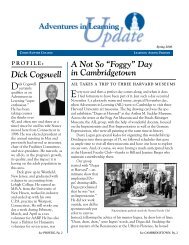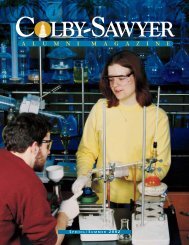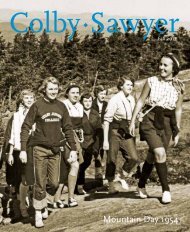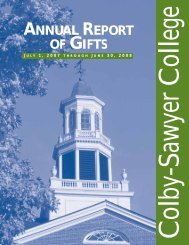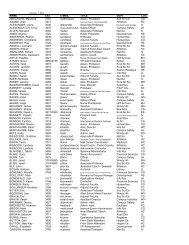A L U M N I M A G A Z I N E - Colby-Sawyer College
A L U M N I M A G A Z I N E - Colby-Sawyer College
A L U M N I M A G A Z I N E - Colby-Sawyer College
You also want an ePaper? Increase the reach of your titles
YUMPU automatically turns print PDFs into web optimized ePapers that Google loves.
Investing in Ideas<br />
Wesson Idea Fund Fuels Undergraduate Research<br />
Often recognized as one of the preeminent philosophers<br />
and logicians of the modern era, Bertrand Russell also<br />
deserves recognition as one of the most quotable public<br />
intellectuals of the 20th century. Of the pearls of wisdom<br />
that Russell freely distributed throughout his long and active<br />
life, one in particular is relevant to those who study the field<br />
of politics: “The greatest challenge to any thinker is stating the<br />
problem in a way that will allow a solution.”<br />
As a pragmatist with keen interest in the world of politics,<br />
I find something compelling about this quotation’s optimistic<br />
faith in the power of inquiry. In my three years as assistant<br />
professor of government and history at <strong>Colby</strong>-<strong>Sawyer</strong>, Russell’s<br />
challenge is rarely far from my mind. It has frequently allowed<br />
me to see opportunities concealed within problems, and at no<br />
time was it more helpful than in the first meeting of the Wesson<br />
Honors Advisory Group for the 2009–2010 academic year.<br />
That fall the Wesson Honors Program faced an intriguing<br />
problem: a huge influx of highly motivated, ambitious and<br />
engaged first-year students. One hundred and two honors<br />
students were joining the program’s 51 sophomores, juniors<br />
and seniors. This new cohort was dramatic evidence of the<br />
program’s success, and yet the prospect of maintaining its<br />
integrity and essential elements while making space for three<br />
times as many scholars represented a complicated challenge.<br />
The Wesson Honors Advisory Group was charged with address-<br />
Near the end of our freshmen year in<br />
spring 2010, my roommate Echo and<br />
I were working quietly in our room when<br />
she asked, “Ky, do you want to go to China<br />
this summer?” I hardly thought before saying<br />
“Yes!”<br />
Echo is from China—her Chinese name<br />
is Wang Yujia—so essentially she was proposing<br />
that I go home with her. We had<br />
already traveled and been through many<br />
adventures together as we were roommates<br />
in Strasbourg, France, where we<br />
spent our first semester of college as part<br />
of <strong>Colby</strong>-<strong>Sawyer</strong>’s first Global Beginnings<br />
Program. Echo had many questions about<br />
American culture as well as the English and<br />
By Eric Boyer<br />
ing the immediate issue of resource allocation. Simply put, how<br />
should the honors program use the generous gift of Jan and Bill<br />
Wesson to continue to achieve its mission in the face of such<br />
sudden and significant growth?<br />
The Wesson Honors Program was designed in 2004 to provide<br />
highly motivated students with an intensive academic<br />
experience that encourages intellectual growth, interdisciplinary<br />
exploration and community leadership. To create an intellectually<br />
curious community of faculty and students, the honors<br />
program integrates small interdisciplinary seminar classes<br />
into <strong>Colby</strong>-<strong>Sawyer</strong>’s liberal arts curriculum.<br />
While this core curricular component serves as the foundation,<br />
the honors program extends beyond the classroom<br />
to encompass co-curricular experiences. Traditionally, the<br />
key component of the co-curricular experiences was the fully<br />
funded “Wesson Weekend” trips, which were constructed<br />
and led by <strong>Colby</strong>-<strong>Sawyer</strong> faculty. Built around a question or<br />
theme, these trips introduced small groups of students to the<br />
economic, political and cultural life of a major urban area. In<br />
2009, the program needed to creatively shift resources in a<br />
way that accommodated the new students without altering<br />
the academic and co-curricular structure that had led to its<br />
successful expansion.<br />
This challenge brought me back to Bertrand Russell’s quote.<br />
Clearly, the honors program’s expansion demanded creative<br />
In Search of Many Truths by Kylie Dally ’13<br />
The author, Kylie Dally, with a new friend, Deepa,<br />
from Gangtok, India.<br />
38 COLBY-SAWYER ALUMNI MAGAZINE<br />
French languages, and our friendship blossomed<br />
from these conversations. I knew<br />
she would be just as receptive to my questions<br />
about China.<br />
Echo thought we should try to incorporate<br />
an academic project into our trip,<br />
as well as broaden the scope of our travels.<br />
Over the next few weeks, we refined our<br />
focus to the issues surrounding Tibet. As an<br />
American, my perspective had been shaped<br />
mostly by “Free Tibet” bumper stickers,<br />
while Echo firmly believes that Tibet is part<br />
of China and Tibetan people are Chinese.<br />
We wanted to know how two opposite<br />
beliefs could be held about the same place.<br />
Was there any objective truth to be found?



